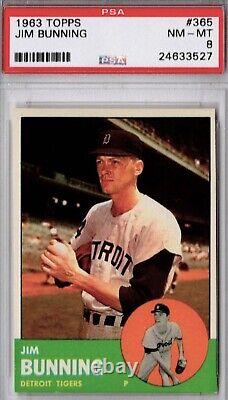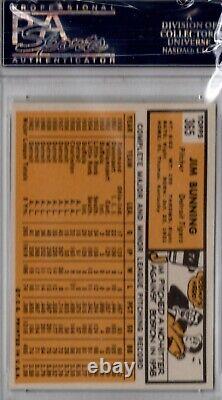Jim Bunning, PSA 8, MLB Hall of Fame, 1963 Topps, MLB All-Star



PSA POP Report - LOW. PSA 9 = (11 Cards). PSA 10 = (0 Cards).
He was the only Major League Baseball player to have been elected to both the United States Senate and the National Baseball Hall of Fame. Bunning pitched from 1955 to 1971 for the Detroit Tigers, Philadelphia Phillies, Pittsburgh Pirates, and Los Angeles Dodgers. When Bunning retired, he had the second-highest total career strikeouts in Major League history; he currently ranks 22nd. As a member of the Phillies, Bunning pitched the seventh perfect game in Major League Baseball history on June 21, 1964, against the New York Mets. It was the first perfect game in the National League since 1880. Bunning was inducted into the National Baseball Hall of Fame 1996. After retiring, Bunning represented players individually as a player agent. He eventually represented as many as 30 players at one time.Represented the state of Kentucky as a United States Congressman & Senator. From the mid-1960s until his retirement from baseball, Bunning was active in the Major League Baseball Players Association (MLBPA), and played a major role in transforming the organization into one of the country's most successful labor unions.
Serving as the pension representative for the American League players and a member of the union's executive board. In 1965, Bunning joined with Robin Roberts, a founder of the MLBPA, to hire a full-time executive director. They agreed on Marvin Miller, then an economist with the United Steelworkers.
Though the MLBPA had been formed in the early 1950s as an attempt to improve pay, benefits, and working conditions for players, team owners were still largely able to impose their will on the players by acting in concert to limit salaries and refrain from offering first rate employee benefits and working conditions, such as suitable stadium locker rooms and a per diem allowance to pay for meals while traveling for away games. As a result, many players had to work in the off season. Many spring training playing fields were unsafe, and lodging and dining facilities were often racially segregated. By the time Bunning retired, the minimum salary and average salary for major league players had nearly doubled.
Over time, the MLBPA also succeeded at eliminating the reserve clause and Major League Baseball's exemption from antitrust laws. 3× Strikeout leader (1959, 1960, 1967). Pitched a perfect game on June 21, 1964. Pitched a no-hitter on July 20, 1958. Philadelphia Phillies Wall of Fame.
